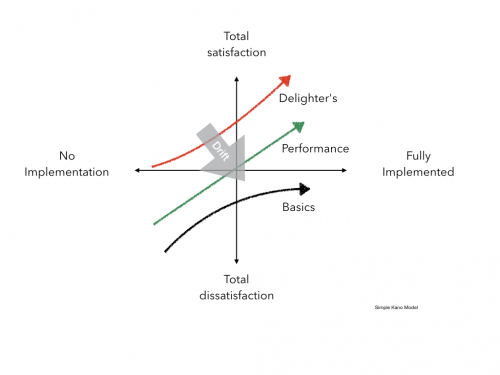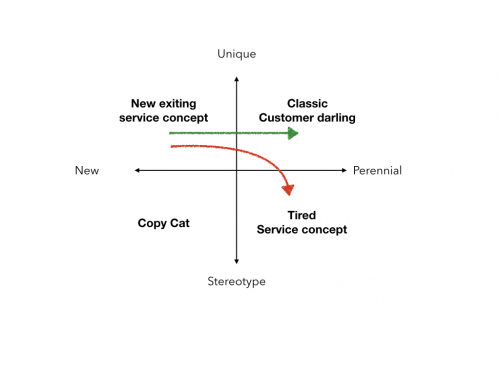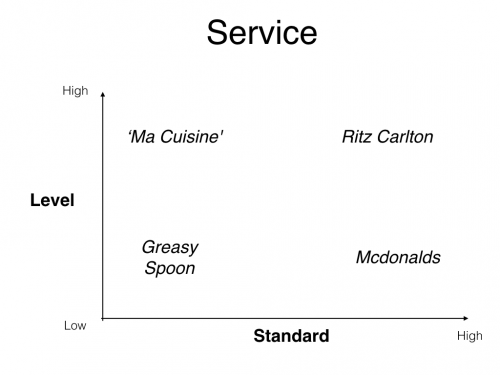
The Kano model teaches us that a service experience has 3 layers. There are basic attributes that need to be in place and that all services in a given category need to have to even qualify as a service. Then there are the performance features, attributes that define the better experience from the very basic experiences. And finally, there is a category of attributes that we call delighters. Things that make our most loyal customers come back again and again. Not only do they come back, they also tell all their friends.

But as we saw in my previous blog post, the trouble with delighter is that they have a tendency to fade over time. There is this notion of drift. Free high-speed internet in a cafe is a great example of this. So this puts all service providers under pressure to constantly innovate. They need to come up with new ways to delight their audience or risk fading into oblivion.
But there is actually another way to do it. There is one type of delighter that somehow never goes stale, that always stays fresh, and that is incredibly difficult for your competition to copy.
The key to understating this is likability.
Think about your own patterns. There are some services that you’re frequent not because of their physical attributes or technical specifications. You may even visit these services despite them not being quite up to par on some of these physical attributes. But there is one or often a whole crew of people that you find likeable. When I lived in Cape Town, we often used to go to Roberto’s. It was not the smartest cafe in town. It was also not the most elaborate culinary experience. But Roberto’s had one thing none of the smart cafes could match; there was Roberto and Roberto was immensely likable. Ah, you may be thinking, but that is a question of DNA, the Italians, the Greeks they know how to do to that, the rest of us don’t have those genes.
Not true.
As Rohit Bhargava explains in his lovely book Likeonomics, research has made the secret available. We know the components of likability and we can apply them to our own way of working and when can train our crew to practice these principles as well.
The key ingredients are: Truth, Relevance, Unselfishness, Simplicity, and Timing.
– Truth: you trust them. When the waiter says the special today is delicious, you know he would not say it if he did not actually mean it. He knows you and when he says you won’t enjoy that wine, you are so grateful
– Relevance: The service provider is not trying to upsell you like a robot (I so hate that expression “upsell”). They make relevant suggestions that actually enhance your experience.
– Unselfishness: They go out of their way no matter what to make sure that you have a great time, even if it is not always the most convenient for them. A hotel where I have conducted workshops recently has two crews working the restaurant. One crew always sets the lunch table for my group in the window area where there is a pleasant view and lots of light. But it is the furthest from the kitchen. The other crew always sets the lunch table at the other end of the restaurant, not nearly as nice. But it’s closer to the kitchen. One crew is likeable, the other one much less so. It comes through in all the little details of how they work because likeable is also an attitude.
– Simplicity. As my vegetarian chef friend says to create a great salad, use only three ingredients; that is what makes it delicious and elegant. As opposed to the salads where they dump the whole fridge into your salad bowl, they mean well I know, but…
– Timing: The person servicing you understands empathy. They are aware of what is going on for you and they adapt their service delivery to suit you. They understand the difference between coming in for dinner before a movie and coming in for dinner to celebrate your spouse’s birthday. And that is all about timing.
Now think again about some of those service experiences that you keep returning to again and again. I will bet you that it is because they are likeable.
And if you can implement these basic ingredients into your service experience, you have discovered the Holy Grail of delivering fantastic service experiences. The concept is simple. The execution is what makes it hard.
Check out the book: Likeonomics: The Unexpected Truth Behind Earning Trust, Influencing Behavior, and Inspiring Action
 If you are not familiar with the intricacies of the Service Profit Chain, we have a special treat for you:
If you are not familiar with the intricacies of the Service Profit Chain, we have a special treat for you:
You can download Mike’s book Best! No need to be cheap if … for FREE using this coupon 8WG55DP7C3. This is only available for a limited number of 30 people so first come first serve!
 If we are successful doing that, we achieve the nirvana of a great service concept and become perennial. My favourite example of this is the Danish Museum of Modern Art in Louisiana, it has existed for more than 50 years. There are certain things that are rock solid consistent and at the same time, they are always reinventing themselves. Brilliant!
If we are successful doing that, we achieve the nirvana of a great service concept and become perennial. My favourite example of this is the Danish Museum of Modern Art in Louisiana, it has existed for more than 50 years. There are certain things that are rock solid consistent and at the same time, they are always reinventing themselves. Brilliant!
